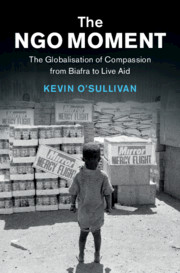Introduction
Published online by Cambridge University Press: 01 October 2021
Summary
This chapter sets out three claims about the NGO moment. First, it argues for viewing the history of non-governmental aid in terms of moments of acceleration: bursts of activity that refreshed the sector while carrying with them the baggage of what had come before. While the specific dynamics of the period between Biafra and Live Aid were vital in facilitating the sector’s emergence, the moral frameworks that guided those organisations were equally the product of a much longer formative process. Second, this chapter explains how those dynamics helped non-governmental aid to supplant other forms of compassion in this period to become the dominant expression of popular benevolence towards the Third World. The broad remit of those organisations’ activities not only subsumed ‘aid’ under a single umbrella; its ideological underpinnings gave it an unprecedented justification to intervene anywhere there was suffering in the world. Finally, this chapter suggests that the story of the NGO moment provides us with several lessons for the writing of global history. It argues for describing globalisation as a constructed, context-contingent process that can only be understood as the product of the interactions between individual, organisational, national and supra-national actors.
Keywords
- Type
- Chapter
- Information
- The NGO MomentThe Globalisation of Compassion from Biafra to Live Aid, pp. 1 - 14Publisher: Cambridge University PressPrint publication year: 2021

